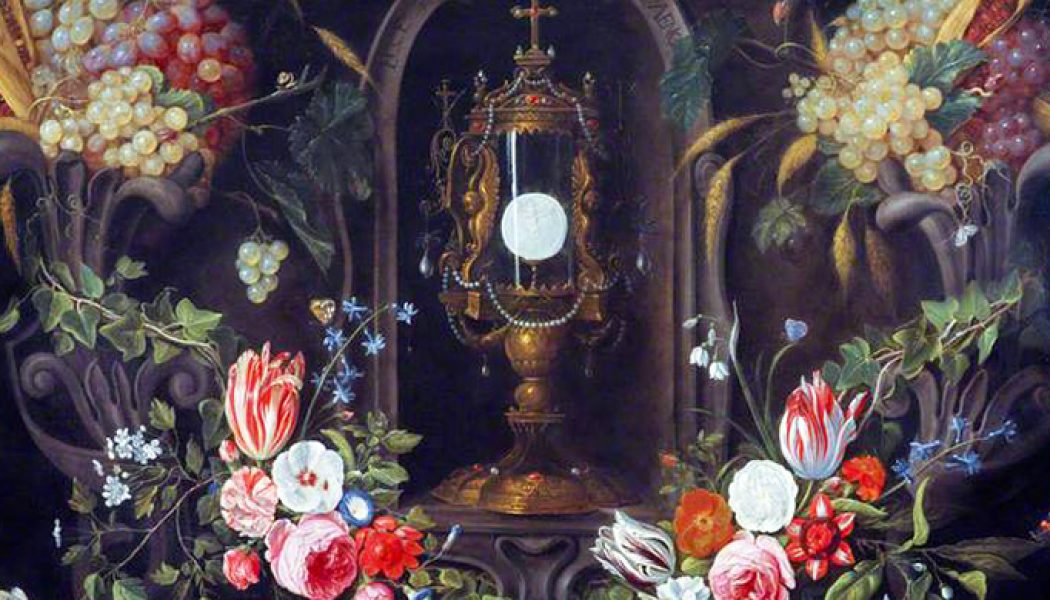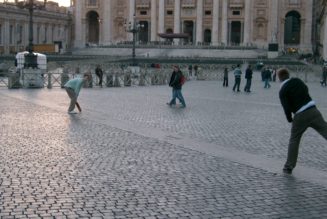
Jan van Kessel the Elder, “Still Life of Flowers and Grapes Encircling a Monstrance”, ca. 1670
“Since I cannot at this moment receive you sacramentally, come at least spiritually into my heart.”
As the coronavirus spreads, the list of canceled events has come to include even Catholic Masses. South Korea closed churches and in Italy, the Italian bishops’ conference announced that all public Masses and liturgical celebrations are suspended until April 3.
As people adjust their habits to include more vigorous handwashing, for Catholics, aspects of their church worship are also being altered such as some holy water fonts have been emptied, handshaking and Communion from the chalice suspended, and one diocese has banned hymnals.
But altering the ways of worship is nothing compared to canceling the worship itself. No Mass means no Eucharist. Jesus gave us his Body and Blood on the cross and instituted the memorial of this great sacrifice at the Last Supper. “Do this in memory of me,” he told us. And so we do at every Mass.
It is only during the Mass at the consecration that the bread and wine become the Body and Blood of Jesus Christ. Thus, canceling Masses is monumental. As explained in the Catechism of the Catholic Church, the Eucharist is “the source and summit of the Christian life. The other sacraments, and indeed all ecclesiastical ministries and works of the apostolate, are bound up with the Eucharist and are oriented toward it. For in the blessed Eucharist is contained the whole spiritual good of the Church, namely Christ himself, our Pasch,” (CCC 1324).
Through this sacrament, “we unite ourselves to Christ, who makes us sharers in his Body and Blood to form a single body,” (CCC 1331).
Holy Communion also cleanses us from venial sins. (If a Catholic is conscious of having committed a “grave sin” he or she must go to Confession before receiving Communion or he commits the additional sin of sacrilege.) “For as often as we eat this bread and drink the cup, we proclaim the death of the Lord. If we proclaim the Lord’s death, we proclaim the forgiveness of sins. If, as often as his blood is poured out, it is poured for the forgiveness of sins, I should always receive it, so that it may always forgive my sins. Because I always sin, I should always have a remedy,” (CCC 1393).
Act of Spiritual Communion
Masses have not been canceled in the U.S. thus far. I hope it stays that way. The Church encourages frequent, even daily, Holy Communion, but if at any time we cannot go to Mass in or out of this season of the coronavirus, we can still unite ourselves to the Eucharist through making a spiritual Communion.
By making an Act of Spiritual Communion, we express our faith in Christ’s Real Presence in the Eucharist and ask him to unite himself with us. Here is the Act of Spiritual Communion written by St. Alphonsus de Liguori:
My Jesus,
I believe that You
are present in the Most Holy Sacrament.
I love You above all things,
and I desire to receive You into my soul.
Since I cannot at this moment
receive You sacramentally,
come at least spiritually into my heart.I embrace You as if You were already there and unite myself wholly to You.
Never permit me to be separated from You.
Amen.
Saints Made Spiritual Communions
In the article “Follow the Saints: Make a Spiritual Communion,” Marge Fenelon explained that saints throughout the ages have witnessed to the value of spiritual Communion. “In a vision, Our Lord explained it to St. Catherine of Siena by showing her two chalices: one made of gold, the other of silver,” she wrote. “He told her that her sacramental Communions were preserved in the gold chalice and that her spiritual communions were in the silver chalice…. St. Teresa of Jesus wrote: ‘When you do not receive Communion and you do not attend Mass, you can make a spiritual Communion, which is a most beneficial practice; by it the love of God will be greatly impressed on you.’”
Many of the saints practiced this throughout the day such as Padre Pio and also St. Josemaria Escriva who encouraged everyone to do so frequently for a closer union with God.
In 7 Secrets of the Eucharist, author Vinny Flynn’s explained, “If you practice the holy exercise of spiritual Communion several times each day, within a month you will see your heart completely changed.” He also related that “Saint Francis de Sales resolved to make a spiritual Communion at least every 15 minutes so that he could link all the events of the day to his reception of the Eucharist at Mass.”
A beautiful way to unite with Jesus is make a spiritual communion before the Blessed Sacrament such as during a holy hour. If it is not possible to do so in person, there are 13 chapels that broadcast adoration 24/7. Go to Online Perpetual Eucharistic Adoration for a listing of sites.









